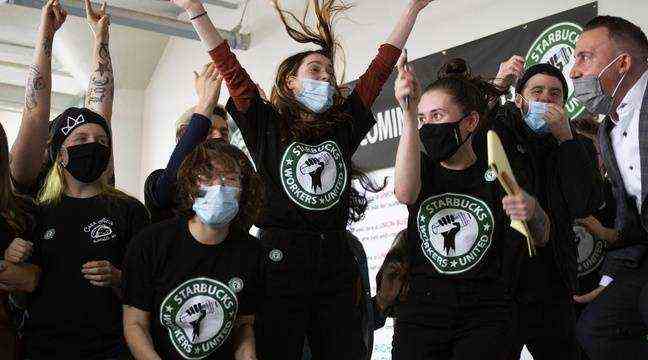Unity is strength. Employees of two Starbucks cafes in the northern United States won a historic victory Thursday by voting to create a union in their establishments. A first in the United States, in 50 years of existence, which could snowball, in a climate of full employment favorable to workers, a month after an unprecedented mobilization during “Striketober”.
The explosion of joy among employees of a Starbucks in Buffalo at the announcement of the results of the vote creating the 1st union (for their establishment only) in 50 years in the history of a group which has 235,000 employees in the US. pic.twitter.com/jyGtAERlM1
– Philippe Berry (@ptiberry) December 10, 2021
Cries of joy and hugs erupted just after the proclamation of the first results in the room where the campaign leaders had gathered. “It’s the culmination of a long road,” responded Michelle Eisen, employed for more than eleven years in the cafe in question, in Buffalo, in northwestern New York State. The battle has been so hard, she says, “with everything Starbucks has thrown in our faces.”
Two stars of the left wing of the American Democratic Party quickly congratulated the employees on Twitter, Bernie Sanders hailing a “historic” victory while Alexandria Ocasio-Cortez a accompanied his message with a raised fist. A second coffee did the same a few hours later, while the initiative failed in a third.
“High bargaining power of employees”
Campaign organizers filed for unionization under the “Starbucks Workers United” (SWU) banner at the end of August and the ballots were sent to all employees on November 10. Now, say new union members, Starbucks must come to the bargaining table.
The company continues to believe that the working conditions it offers do not justify the creation of an intermediary between employees and management. But “it respects the right of (its) partners to form a union,” said a representative of the company.
Like the unionization attempt at an Amazon warehouse in Alabama in the spring, the Starbucks worker campaign has gained attention far beyond the streets of Buffalo, New York.
It reflects the discontent of employees determined to fight, at a time when the dynamics of the labor market are favorable to them, notes Cedric de Leon, professor of sociology at Massachusetts Amherst University.
While many employers are struggling to recruit, “the bargaining power of employees is very high at the moment,” he explains, referring to the many strikes that have punctuated the month of October or the millions of Americans who have chosen these. last months to resign.
Intense cadences
When he joined Starbucks in May, Will Westlake, 24, congratulated himself on working for a group that regularly brandishes its progressive values and generally offers better working conditions than other cafes.
“But when I started, I realized that this was not necessarily the case,” he told AFP. He was particularly shocked to find that people who had worked for several years were earning little more than him, but also complained of intense work speeds.
The pro-unions were all the more motivated as Starbucks showed resistance. A few weeks after the launch of the union mobilization, the group announced several measures such as raising its minimum wage or better consideration of seniority.
But he also, according to the organizers of the campaign, deployed the great means to try to convince the employees to vote no, in particular sending a battalion of executives in the region. If the group is so worried about the arrival of a union, even in a single café, “it’s good because it could start a wave within the company,” notes Cedric de Leon.

